Ultra-Indie Spotlight Sundays: The Possession Experiment
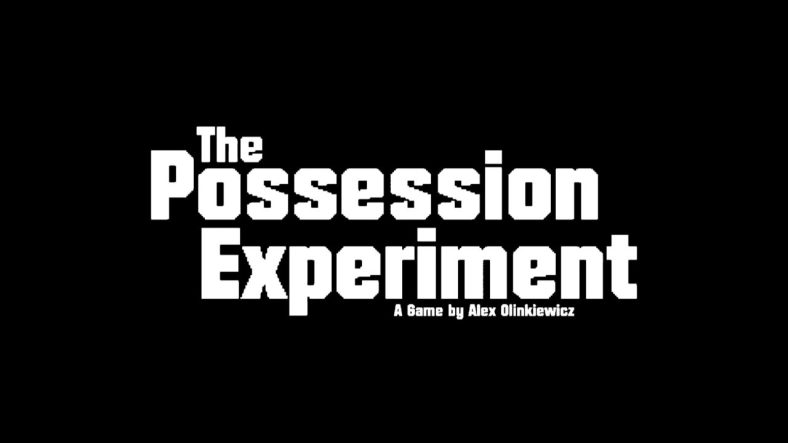
I feel like we need some kind of taxonomy for indie games. The word gets thrown around a lot, and I’m not just talking about the, “small indie studio” CD Projekt meme. It feels like people more often use it to describe something they like rather than the actual budget. FTL made $200k on Kickstarter, which puts it well out of the realm of two dudes making a game with naught but a dream. We consider the budget of Undertale to be modest at $51k, which is four times what I made last year (charity work isn’t exactly a moneymaker). Lucas Pope worked for Naughty Dog before making Papers, Please, so he’s hardly an industry outsider. Before you assume I’m throwing some mad shade, I’m deliberately picking games that I 10/10 adore. But if my time on itch.io has taught me anything, there’s some way weirder shit out there made by total outsiders with barely the budget for a working computer.
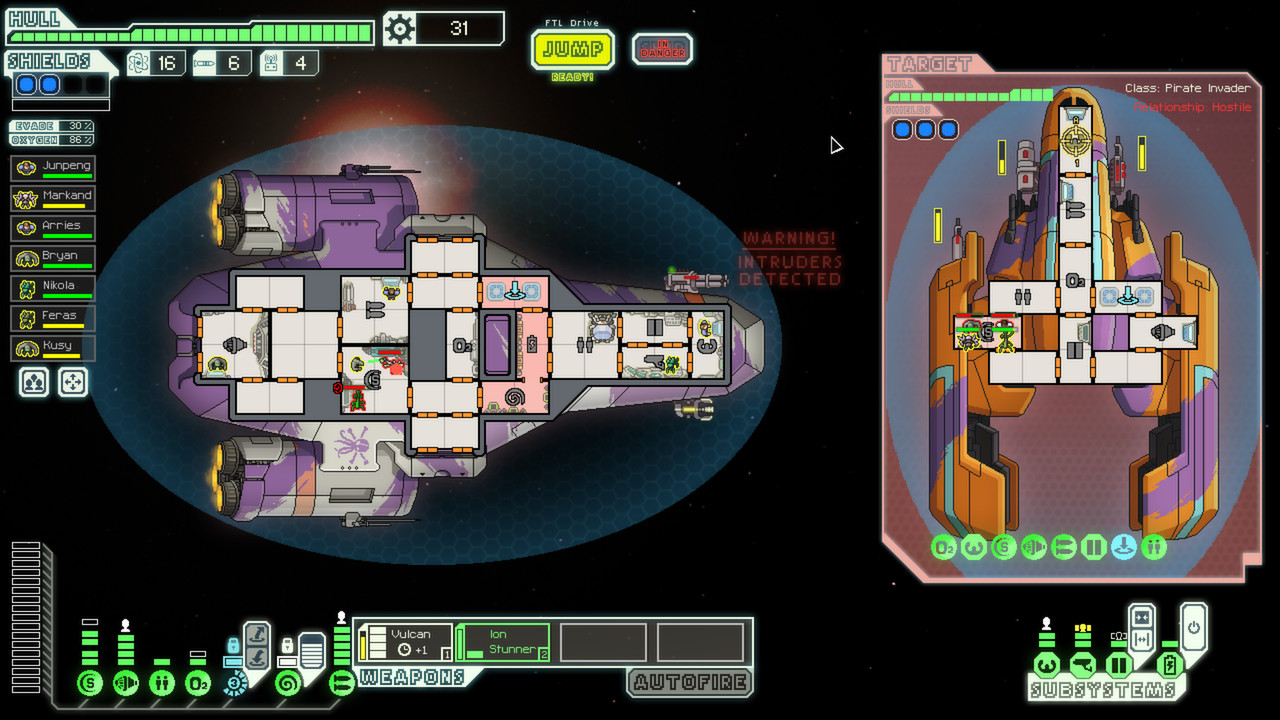
Most of these games aren’t really reviewable. They’re almost always free, and usually just a proof of concept for a dreamed larger project. There’s no one telling them what not to do. Ideas are as unrestrained as an old-timey tonic salesman pitching a crowd of dirty townsfolk his new rattlesnake butter. Sometimes it’s wonderful. Sometimes it causes necrosis and coagulopathy. It’s a crapshoot. But the results are often interesting.
So with that in mind, I’ve decided to start a new weekly dive into these bizarre no-budget games. Every Sunday, I’ll pick one of the games from itch.io I arbitrarily decide as most worthy of covering. Remember, this is the world of ultra-indie. Concepts reign higher than polish. Playability is not guaranteed. This isn’t a showcase of what’s best. It’s a breakdown of the game’s ideas, the core concept, what worked, what didn’t work, and what can be fixed. After all that, I’ll wrap up with some quality wanky musings. So if you’re a fan of the experimental, join me on this journey to the depths of indie madness. Starting with: The Possession Experiment!
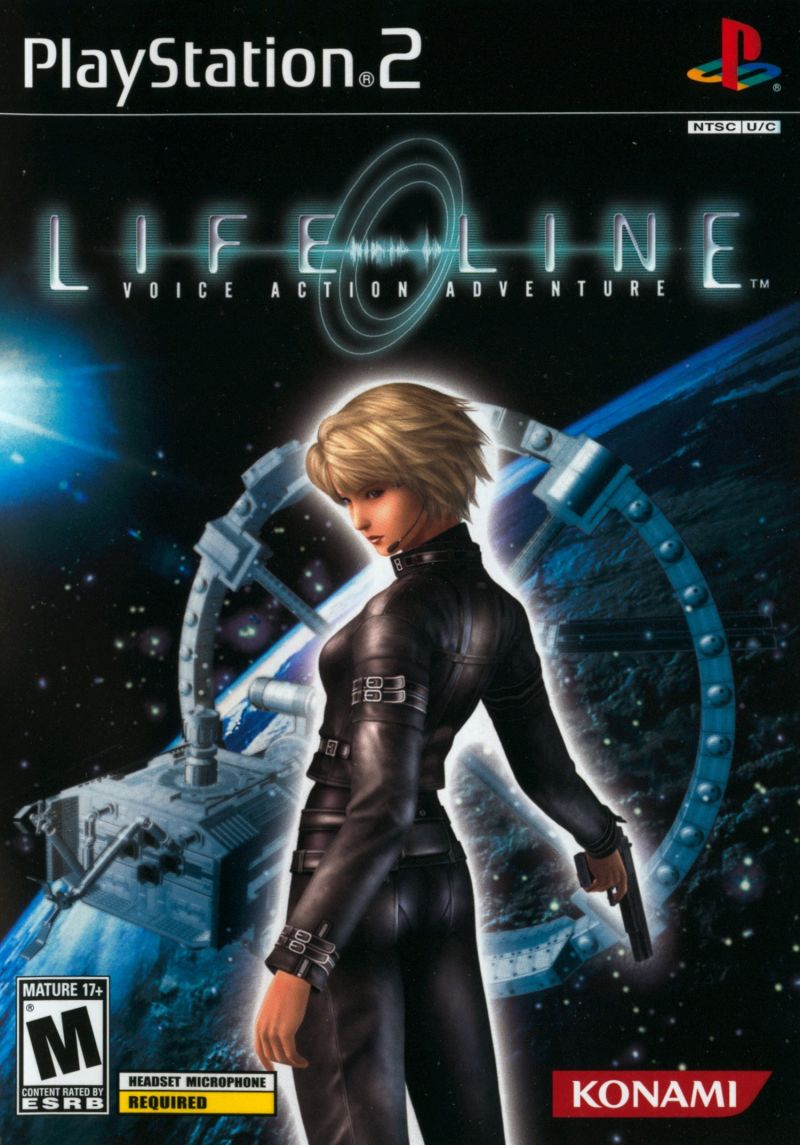
Conceptual Meta-Wank:
Does anyone remember the old PS2 game Lifeline? Probably not. In a time before the battle for which motion control mechanic could suck hardest, experimental games had to invent their own gimmicks. For Lifeline, that gimmick was voice control. A sci-fi survival horror adventure, Lifeline came bundled with a USB headset that allowed you to literally tell the character where to go and what to do. The premise was that you didn’t actually play as the character on screen, but as a guy stuck in a control room. Your only way of communicating with the protagonist was to give her verbal commands. To Lifeline‘s credit, it worked okay. The game understood over 500 voice commands, and it recognized them with a frequency better than you’d expect from 2003. The biggest problem is that there’s only so much you can do, even with 500 commands. As soon as you have more complex commands than “walk there” or “pick up the item,” you start having the monotonously break things down to chunks the game can comprehend. Given that people frequently complain about the complexity of IKEA furniture, it was a confusing experience for a depressing number of gamers.
Regardless of its shortcomings, Lifeline did propose an interesting idea. What if your character isn’t the person you see on screen? What if you are just some observer, controlling the character directly or indirectly? Obviously, this is the case for every video game. I am not actually Kratos, the God of War. I am Ted, the Player of Game. By acknowledging that the player is in fact playing a game, the cognitive dissonance between player and game world is paradoxically eroded. By no longer asking me to assume that I am Kratos, Ted himself can be transported into the story. The question then becomes how to interact with this world.
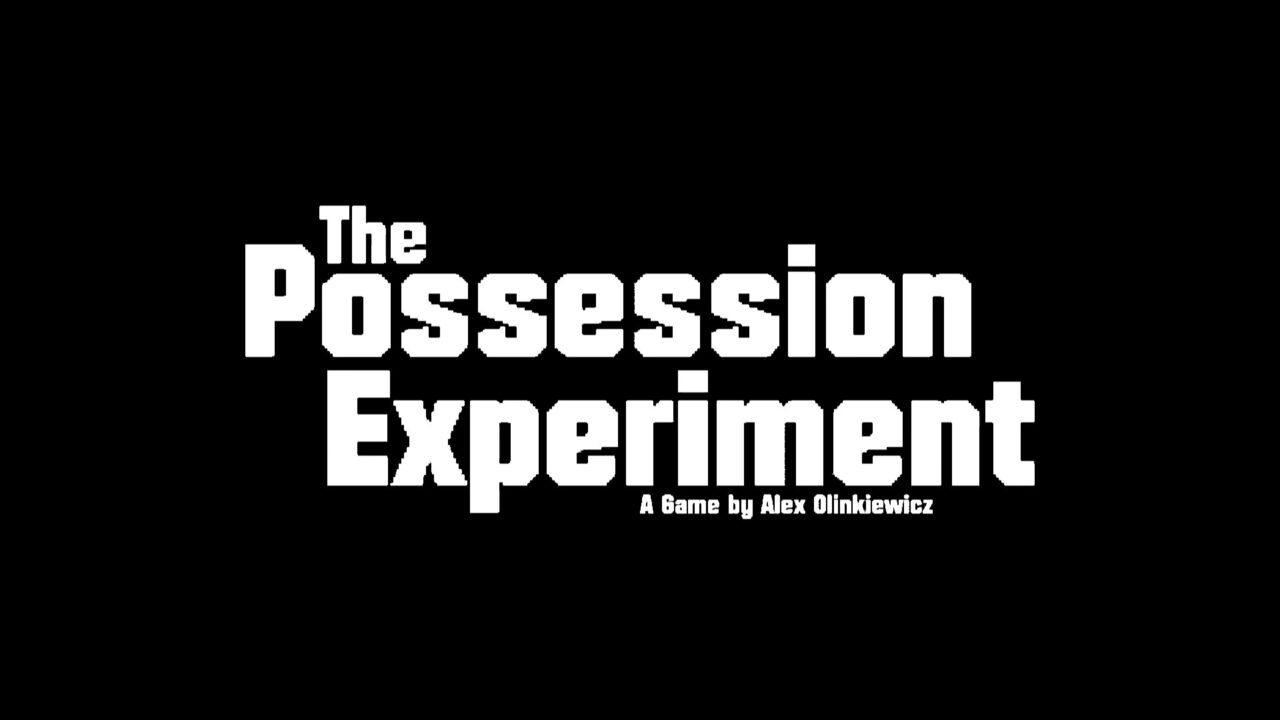
Non-Wanky Game Recap:
The Possession Experiment is a new experimental indie game that’s right at home on the pages of itch.io. Taking place in an underground facility à la SCP, an evil entity known as the “Entity” has broken free. Normally this would trigger the base’s built-in EMP, but that failed to go off. You play as a scientist trapped in the control room. You’re safe for now, but need to figure a way out before the Entity breaks in. Also trapped are three test subjects of a mind-control experiment. Lucky for you, your ass is plopped right behind the mind-control computer.
As the immobile scientist, the mouse controls the movement of your head. You can use it to look around the control room, but your focus is on the monitors in front of you. The three monitors display the inventory/status of the test subjects, whatever camera displays your current subject, and the facility map. You’re free to look between them as you play, but you’ll mostly focus on that camera monitor. The keys you press then control that character on the screen. You’ll take control of the subjects one at a time, collecting keys and weapons as you try to fight your way out of the facility.
I have no idea if those meta-concepts were the inspiration for The Possession Experiment. The itch.io page states that the game is, “a hybrid of Classic PS1 Horror Games like Silent Hill and Resident Evil and modern horror games like Five Nights at Freddy’s.” Developer Alex Olinkiewicz was probably just trying to remix some older ideas like tank controls and fixed camera angles with something the kids would recognize. Still, it’s a novel way to work classic concepts into your world. Why are all the camera angles fixed? Because you’re actually looking through fixed cameras. Why do I have three lives? because you’re controlling three people. Why are there tank controls? Because… possessing people is hard? Okay, maybe it doesn’t all make perfect sense.
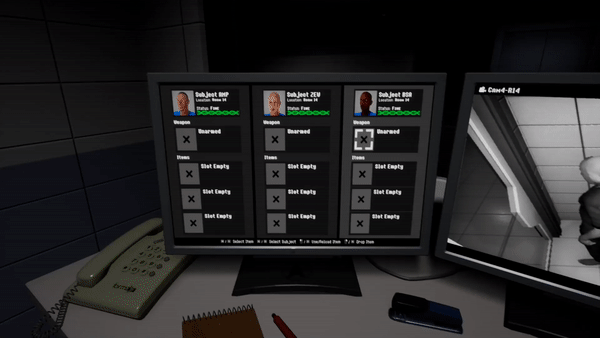
What Works:
For a game made by 1 guy in 60 days for 0 dollars, The Possession Experiment has a remarkable amount of dedication to its premise. Which is smart, since the concept is the strongest feature. There are the government-mandated standard text logs, but they flesh things out more than I was expecting. I didn’t need to know why stabbing the Entity makes it disappear, but I appreciate that the game had an explanation. You can also look around the control room to pick up on little details about the facility. Before you take control of the subjects, one of the monitors displays a little backstory to set the stage. The control room is also a physical space within the game world. If your subject walks by, you can look up and see him jogging through the hallway. It’s a small detail, but I appreciate the little extra level of immersion.
Most importantly, The Possession Experiment‘s gameplay style helps sell this unique aesthetic. The Two-layered perspective (player to monitor, monitor to camera) really sells the idea of separation between you and the test subject. You feel the frustration of trying to control this lumbering zombie with your limited faculties. You’re combating the Entity as much as your constrained perspective and obtuse controls.
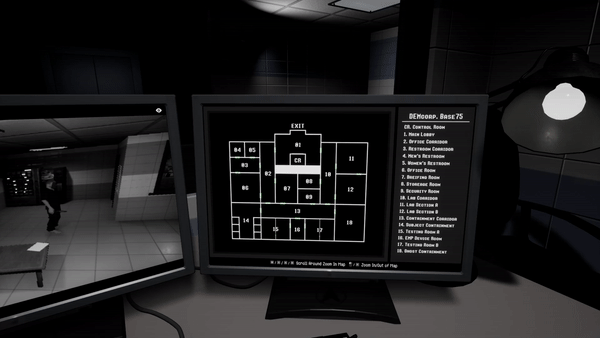
What Doesn’t Work:
I won’t lie, part of that previous paragraph was me trying to colorfully decorate the fact that The Possession Experiment is ludicrously hard to play. We left tank controls in the past for a very good reason. There’s an analog option for movement, but the scheme hasn’t been optimized for the camera. When you have rapidly switching fixed perspectives, it’s always awkward to try to adjust your input to where your character is now in relation to the camera. You generally solve this by having a grace period where the currently chosen direction overrides the new perspective. So if you’re holding down to walk down and the camera flips to make that direction now up, the held down command will still take you down. It only really works when you have larger environments where the player can then take the time to adjust their brains and fingers. In The Possession Experiment, new perspectives are so rapid and environments constrained that you’ll constantly be dancing between doorways just trying to figure out which way is up.
The Possession Experiment is also the stupid kind of hard. I knew I was in for a rough time when all of the mandatory itch.io YouTube channel adds disguised as comments couldn’t beat the damned game. Challenge can be fun, but this is the bad kind of challenge. When a character dies, all of their items are dropped with them. Your next character can then go pick up those items and carry on where they left off. The big problem is that no new items spawn to help out this new character. If the Entity happens to spawn between you and your previous dead body, you’re just fucked.
The Entity is also relentless, and the game never gives you a second to take a breath. This can be a good thing, but The Possession Experiment is designed to be deliberately cumbersome. You have to look over at the map to figure out what number Ghost Containment room is, then figure out where you are in relation to that with only contextual clues. Using items is also a nightmare. Figuring out how to use a medkit actually felt like a trap, as every second spent wrestling with the controls was a second the Entity was hunting for my delicious ass.
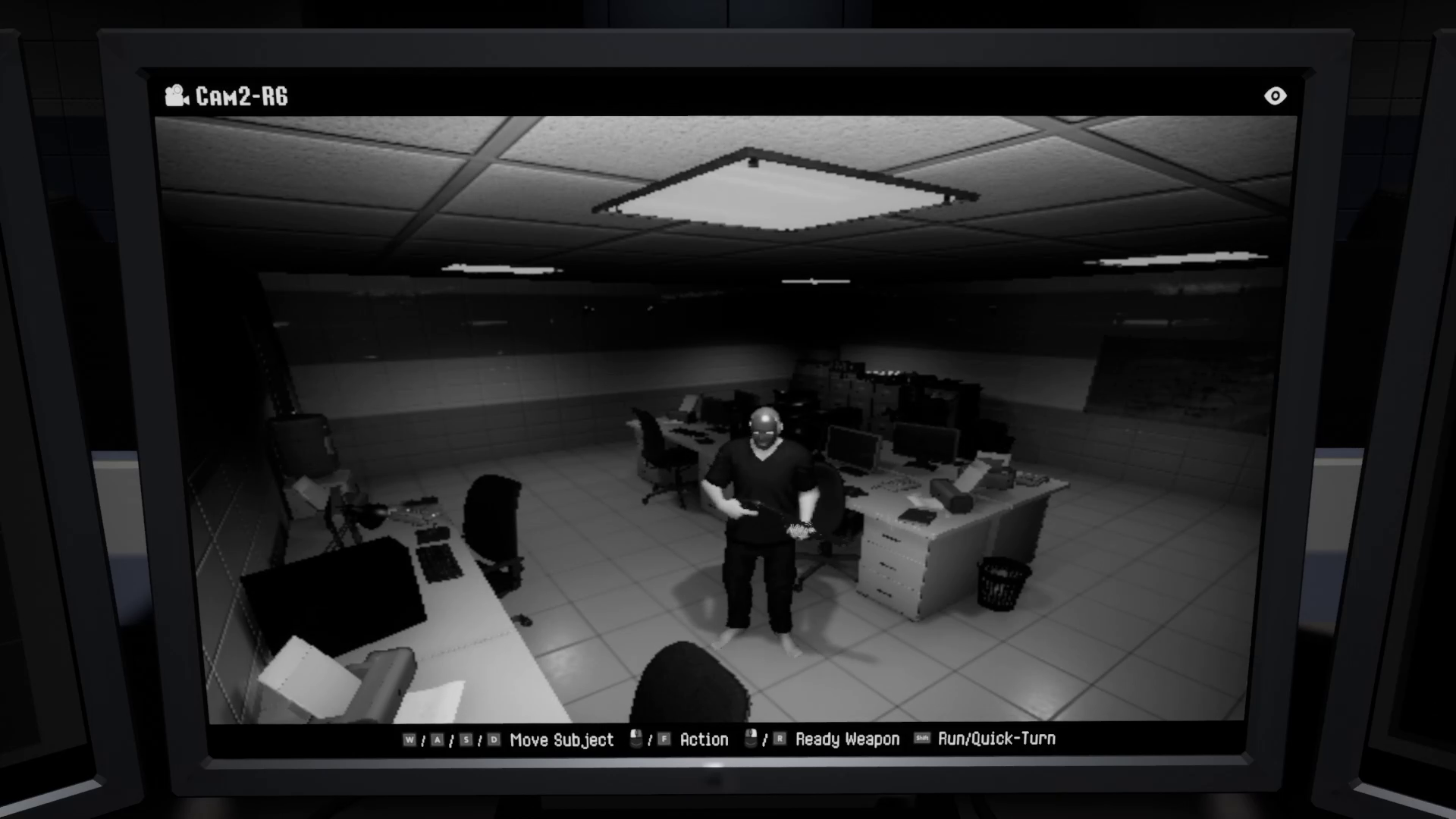
What Can Be Fixed:
My immediate reaction to The Possession Experiment is that it values its ideas over playability. This is a game in dire need of some honest playtesting. Just a cursory glance makes it apparent that the game needs some more pulled back camera shots. A fixed camera is fine, but if I’m swapping angles 3 times in a room the size of my bathroom then I’m going to get motion sickness. The map also is in desperate need of some functionality. Make the locked rooms Red, highlight the room I’m in, anything to make trying to figure out where I am and where I need to go manageable. As it is, it feels like I’m a tourist that got separated from my group in a country where no one speaks English. I’m just clinging to statues and hoping they’re the one close to my hotel.
Some more complex fixes involve pacing and controls. There needs to be an easier way to use items. Perhaps a key that opens my inventory on the main monitor. Swapping my perspective back and forth is an extra layer of confusion I don’t need. Also, there is a sweet spot somewhere out there where the entity feels menacing but not overbearing. Make it spawn less, make running away an option, or designate certain rooms as ghost proof so I can catch a breather. As it stands, the difficulty makes the game almost unplayable.
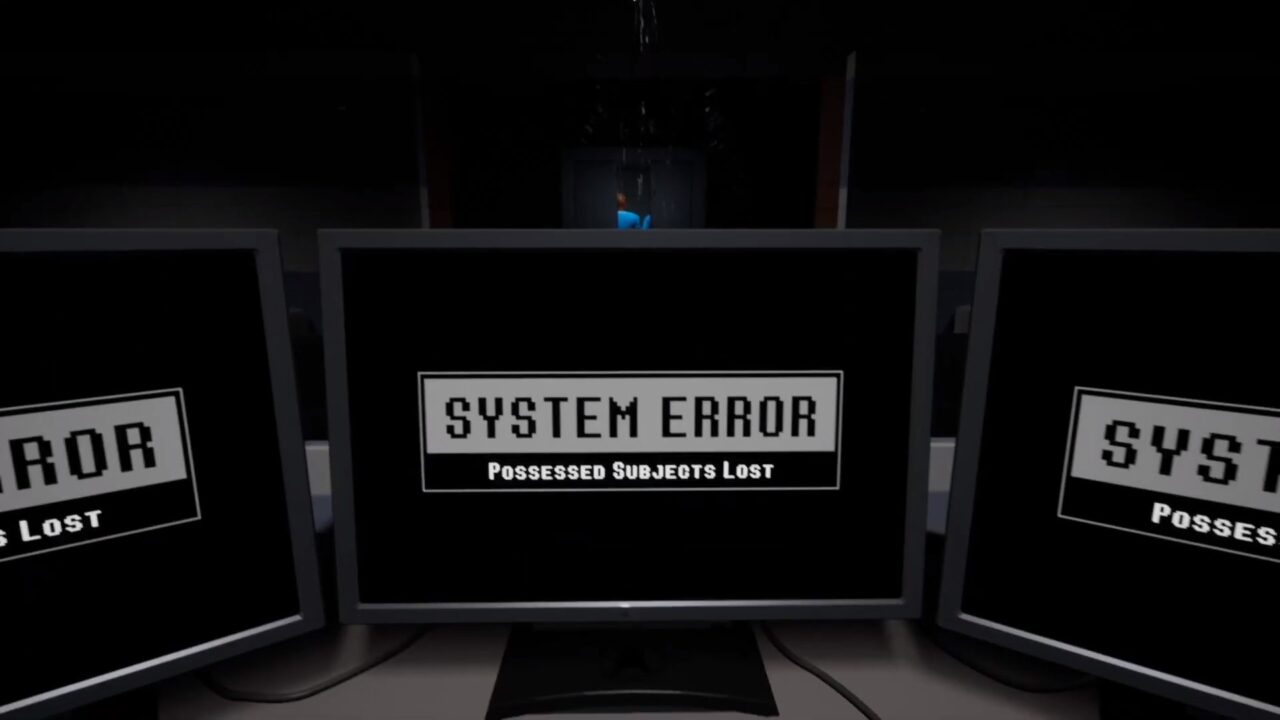
Wanky Musings:
As I was wracking my brain thinking of ways to fix The Possession Experiment, it struck me how close this game was to being good. It’s 80% of the way to being a really solid free itch.io ultra-indie horror game. I know that was a lot of qualifiers, but there’s a definite market for that. And yet, that missing 20% makes the game feel 60% unfinished.
The harder question is whether or not The Possession Experiment needs to be finished. As the name implies, it’s an experiment. Moreover, the world isn’t going to implode if every game doesn’t reach its full potential. There are a dozen games coming out every day, and 99% of them are in various states of incomplete. Most of them will never even see their first update. So should Mr. Olinkiewicz keep working on The Possession Experiment, or move on to the next thing?
Unfortunately, I worry that The Possession Experiment is fucked from the jump. The concept is very intriguing, and I think the idea of a guy trapped in a room controlling people should be explored. However, bringing back old controls is too niche and complicated for the limited appeal. Getting the correct angles and movement flow is complicated, and I don’t feel there’s enough of a market to justify the effort. Controlling a character that you observe through security cameras is a fun novelty, but as a core mechanic quickly becomes cumbersome. There’s a reason that Resident Evil dropped it 15 years ago.
If you’re a fan of indie horror, you should definitely check out The Possession Experiment. The retro-appeal isn’t the draw that it thinks it is, but the novel perspective is definitely worth your time. If the game gets updated, I’ll definitely take another look. I’m rooting for this one. That being said, I’m definitely a fan of the style and not the substance.
Categorized:Editorials Horror Gaming Ultra-Indie Spotlight

